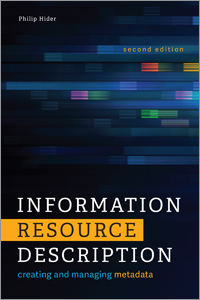
Information Resource Description: Creating and Managing Metadata, Second Edition
Customers outside of North America (USA and Canada) should contact Facet Publishing for purchasing information.
Primary tabs
You don't need to be an ALA Member to purchase from the ALA Store, but you'll be asked to create an online account/profile during the checkout to proceed. This Web Account is for both Members and non-Members.
If you are Tax-Exempt, please verify that your account is currently set up as exempt before placing your order, as our new fulfillment center will need current documentation. Learn how to verify here.
- Description
- Table of Contents
- About the author
- Reviews
This new edition of Information Resource Description offers a fully updated and expanded overview of the field of information organization, examining the description of information resources as both a product and process of the contemporary digital environment. Through this unifying framework, the book provides an integrated commentary of the various fields and practices of information organization carried out by today’s information professionals and end-users. Key topics and updates to the first edition include
- discussion of Big Data vs. the traditional database model;
- an exploration of FRBR-LRM user tasks;
- expanded coverage of scholarly repositories and questions around Open Access;
- new section on the history of information organization;
- expanded discussion of the functions, economics, and management of metadata; and
- a new section on mobile access.
This book will be useful reading for LIS students taking information organization courses at undergraduate and postgraduate levels, information professionals wishing to specialize in this field, and existing metadata specialists who wish to update their knowledge.
Examination copies are available for instructors who are interested in adopting this title for course use.
List of figures and tables
Preface to the First Edition
Preface to the Second Edition
List of abbreviations
1 Definitions and scope
Information resources
Resource description
Metadata
Elements, values, format and transmission
Managing metadata
The contemporary information environment
Information organization
A potted history
Search engines, linked data, data mining and granularity
Overview of this book
References
2 Information resource attributes
Introduction
Describer and user contexts
Information resource contexts
The functions of metadata
From attributes to elements
References
3 Tools and systems
Introduction
Arrangements
Indexes and databases
Bibliographic databases
Library catalogues
Federated search systems
Archival finding aids
Records management systems
Museum registers
Content management and repository systems
Search engines
Online directories
Bibliographies
Citation databases
References
4 Metadata sources
Introduction
Resource creators
Publishers
Information professionals
Library cataloguing
Metadata librarianship
Indexing and abstracting
Archival description
Records management
Museum documentation
Information architecture
End-users
Computers
References
5 Metadata quality
Introduction
Functionality
Comprehensiveness
Accuracy
Clarity
Consistency
Vocabulary and authority control
Principles of best practice
Quality assurance
Cost–benefit analysis
References
6 Sharing metadata
Introduction
Library catalogue records
Metadata from repositories, archives and museums
Interoperability
Linked data
References
7 Metadata standards
Introduction
Web publishing
Libraries
Digital libraries
Archives
Records and document management
Museums
Book publishing
Book indexing
Database indexing
Research
Education
Audiovisual industries
Registries of standards
References
8 Vocabularies
Introduction
Controlled subject vocabularies
Subject headings
Subject thesauri
Subject classification schemes
Taxonomies
Ontologies
Non-subject vocabularies
Vocabulary mapping and directories
Identification systems
References
9 The future of metadata
Introduction
Three approaches to information access provision
Content-based information retrieval
Social metadata
Professional description
Conclusion
References
Further reading
List of metadata standards
Archival description and recordkeeping
Library cataloguing rules
Principles and models for cataloguing rules
Indexing and abstracting
Style manuals
Museum documentation
Schemas
Subject heading lists
Classification schemes
Name heading lists
Identifiers
Encoding and transmission standards
Registries and directories
Index
Philip Hider
Philip Hider is Head of the School of Information Studies at Charles Sturt University, Australia. He has worked, taught and researched in the field of information organization in the UK, Singapore and Australia. He holds a PhD from City University, London and was made a Fellow of CILIP in 2004.
"An insightful, well-balanced account of the current state of metadata work across a range of contexts, but with a clear understanding that use is the primary criteria in all cases by which metadata practices should be judged. It will be useful to anyone wishing to get a richer understanding of the diverse roles metadata plays in our complex information-laden environment."
— Technicalities
"While the book does not presume any previous knowledge of the field, neither is it a basic textbook or primer. Relevant illustrations and tables, including screenshots, are well-placed and effectively supplement the text ... [this book] will be useful for LIS students, metadata specialists, cataloging professionals, and anyone interested in the process of proving access to electronic resources."
— Online Searcher
"As a cataloging and metadata librarian of almost a decade, I found much in this monograph that was interesting, new to me, and worth knowing. While this book would be a good introduction to the subject for students or new professionals, it is equally useful for established librarians who have the background knowledge that allows them to build on and contextualize that information with Hider's historical and theoretical sections."
— Technical Services Quarterly
Praise for the second edition
"As we enter the infosphere, and documents in an increasing variety of forms and media become ever more essential for our society, so the problems of organising information increase. This second edition of Philip Hider's book addresses one essential component: the organizing of information resources through their description. Its focus on general principles expressed in different contexts, and its equal treatment of systems, sources and processes, makes it a valuable addition."
— David Bawden, Professor of Information Science, City University London


